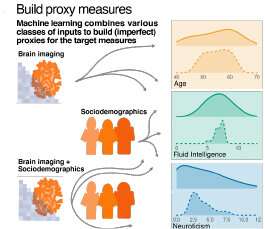
A study published today by an interdisciplinary collaboration, directed by Denis Engemann from Inria, demonstrates that machine learning from large population cohorts can yield “proxy measures” for brain-related health issues without the need for a specialist’s assessment. The researchers took advantage of the UK Biobank, one of the world’s largest and most comprehensive biomedical databases, that contains detailed and secure health-related data on the UK population. This work is published in the open access journal GigaScience.
Mental health issues have been increasing worldwide, with the WHO determining that there has been a 13% increase in mental health conditions and substance abuse disorders between 2007 and 2017. The burden these diseases place on society is extensive, negatively impacting nearly every area of life: school, work, family, friends, and community engagement. Among the many issues impeding the ability of society to address these disorders is that diagnoses of such health issues requires specialists; the availability of which ranges drastically across the globe. The development of machine learning methodology for the purposes of facilitating mental-health assessments could provide a much needed additional means to help detect, prevent and treat such health issues.
To develop AI models sensitive to mental health, the researchers at Inria (Saclay—Île-de-France) and their colleagues turned to the UK Biobank for the data needed. The UK Biobank stores not just biological and medical data, but also questionnaire data about personal circumstances and habits, such as age, education, tobacco and alcohol use, sleep duration and physical exercise. Specific for this study, these questionnaires also include sociodemographic and behavioral data, such as moods and sentiments of the individuals, and biological data includes Magnetic Resonance (MR) images of 10,000 participants’ brain scans.
The Inria scientists combined these two data sources to build models that approximate measures for brain age, and scientifically defined intelligence and neuroticism traits. These serve as “proxy measures,” which are indirect measurements that strongly correlate with specific diseases or outcomes that cannot be measured directly. Developing approximations in this way has been successfully employed in the past for predicting “brain age” from MR images. This previous body of neuro-clinical work served as a starting point for Denis Engemann and his team.
Engemann explains: “In this work, we generalized this methodology in two ways. First, we demonstrated that, beyond biological aging, the same proxy-measure framework is applicable to constructs more directly related to mental health. Second, we showed that useful proxy measures can be derived from other inputs than brain images, such as sociodemographic and behavioral data.”
The researchers validated their proxy measures by demonstrating the same results in a separate subset of UK Biobank data.
The results of the work here provide a glimpse into a future where psychologists and machine learning models could work hand-in-hand to produce increasingly fine-grained and personalized mental assessments. For example, in the future clients or patients may grant a machine learning model secured access to their social media accounts or their mobile phone data, to then return proxy measures that are useful to both the client and the mental health or education expert.
Source: Read Full Article
